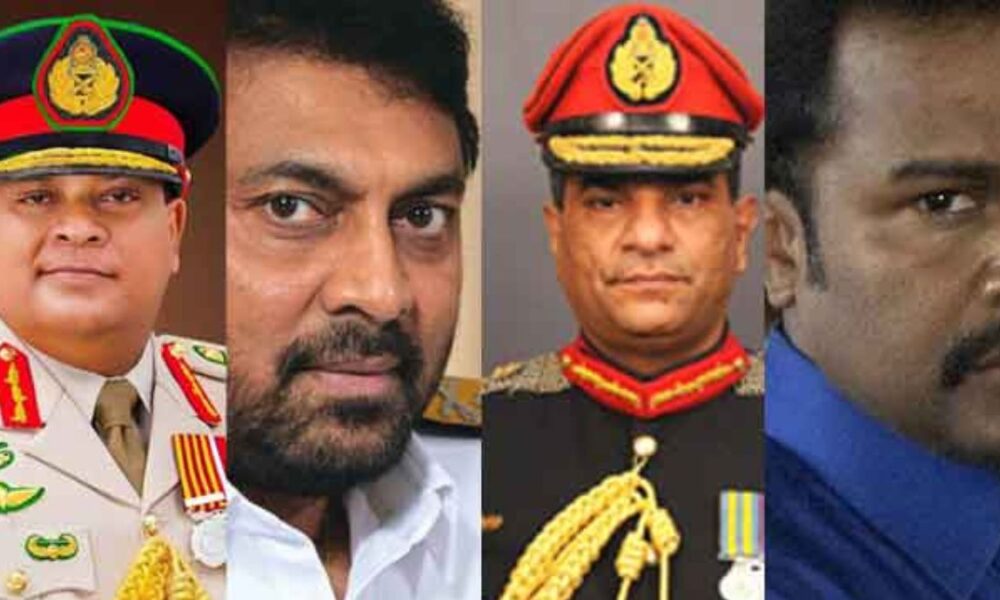A Calculated Move or a Symbolic Gesture?

(Lanka-e-News -26.March.2025, 11.30 PM) The recent decision by the UK government to impose sanctions on four Sri Lankan individuals—three from the military and a former LTTE leader—has sent political shockwaves across Colombo, Tamil diaspora circles, and the broader geopolitical landscape. While the sanctions may appear, at first glance, as an overdue reckoning with Sri Lanka’s turbulent history, a deeper examination reveals that the move is as much about global diplomacy as it is about justice.
The UK has long been a key player in international human rights advocacy, particularly in relation to Sri Lanka’s civil war. These sanctions, targeting figures implicated in alleged war crimes, signal London’s renewed interest in holding Sri Lanka’s power brokers accountable. However, skeptics argue that the UK’s sudden assertiveness may be a political calculation rather than a principled stance. After all, successive British governments have maintained diplomatic ties with Sri Lanka despite persistent allegations of human rights abuses.
The sanctioned individuals include three military officers, a clear nod to longstanding allegations of war crimes against the Sri Lankan Armed Forces. But what has raised eyebrows is the inclusion of a former LTTE leader. While the Tamil diaspora has been pushing for action against Sri Lankan military figures, the inclusion of an ex-LTTE commander complicates the narrative, subtly reinforcing the UK’s "both sides" approach.
Unsurprisingly, Sri Lanka’s right-wing Sinhalese politicians have seized upon the sanctions as an opportunity to stoke nationalist sentiments. They have framed the UK’s move as yet another instance of Western interference, tapping into long-standing post-colonial grievances. Some have even suggested that the sanctions are part of a broader Western agenda to weaken Sri Lanka at a time when the country is already facing economic and political turmoil.
With local elections on the horizon, expect Sinhalese nationalist parties to weaponize this issue, portraying themselves as defenders of Sri Lanka’s sovereignty against foreign meddling. The irony, of course, is that many of these same politicians have no qualms about courting foreign investment from China and India when it suits their interests.
On the other side of the spectrum, Tamil politicians have also sought to capitalize on the UK’s decision. Figures like M.A. Sumanthiran, who suffered electoral setbacks, have been quick to highlight the sanctions as validation of long-standing Tamil grievances. Yet, critics within the Tamil community argue that such leaders often engage in performative diplomacy—rushing to Western embassies, issuing statements, and then failing to sustain meaningful political momentum.
There is a clear pattern: whenever a foreign government takes action against Sri Lanka, certain Tamil politicians express triumphalism, only to lose focus when the geopolitical winds shift. This lack of sustained political strategy has been a recurring weakness in Tamil representation, leading to repeated disappointments.
The Tamil diaspora, particularly in the UK and Canada, has long been a vocal advocate for justice. However, their approach has often been criticized for being reactive rather than strategic. Protests, petitions, and symbolic gestures dominate diaspora activism, but there remains a disconnect between grassroots mobilization and sustained diplomatic engagement.
Sanctions alone will not deliver justice. If the diaspora wishes to see tangible policy changes, it must adopt a more sophisticated approach—working with international institutions, engaging policymakers beyond moments of crisis, and developing long-term legal and diplomatic strategies.
Sri Lanka’s geopolitical significance ensures that any international action against it is never purely about human rights. The UK’s sanctions come at a time when Sri Lanka is caught in a geopolitical tug-of-war between China, India, the US, and Russia.
China, which has been Sri Lanka’s most reliable economic backer, will undoubtedly view these sanctions as an opportunity to reinforce its role as Colombo’s primary ally. India, meanwhile, has a vested interest in maintaining stability in its southern neighbor, and its response will be carefully calibrated to avoid alienating either the Sinhalese or Tamil constituencies. The US, which has its own strategic interests in the Indian Ocean, will likely interpret the UK’s move as a precursor to broader Western pressure on Sri Lanka.
For Sri Lanka, the challenge will be to navigate this complex geopolitical landscape without further jeopardizing its already fragile economy. The government may seek to leverage its relationships with China and India to counterbalance Western pressure, but this balancing act will become increasingly difficult if human rights concerns gain greater international traction.
The UK’s sanctions are significant, but whether they will lead to meaningful change remains uncertain. Sri Lanka has a history of weathering international criticism without making substantive reforms. Moreover, the geopolitical stakes mean that Sri Lanka will always have powerful allies willing to provide economic and political cover.
For the Tamil community, the lesson is clear: symbolic victories in Western capitals must be matched by sustained political and legal efforts. For Sinhalese nationalists, the challenge will be to resist the temptation of short-term political gains at the cost of long-term international isolation. And for the global powers watching from the sidelines, Sri Lanka’s fate will remain a convenient playing piece in a much larger game.
-By A Special Correspondent
---------------------------
by (2025-03-26 18:11:39)
Leave a Reply